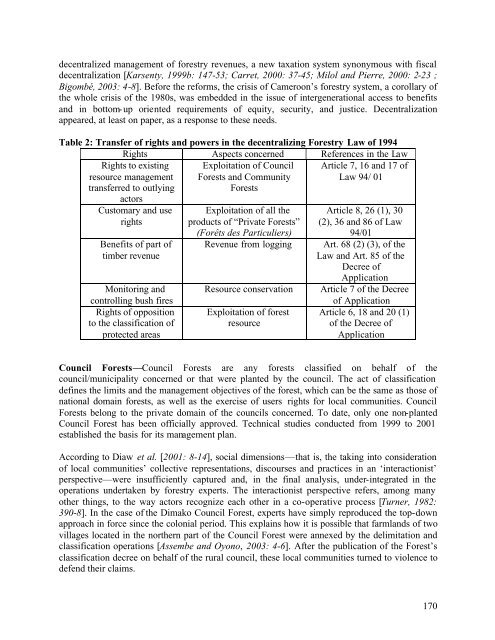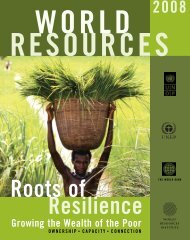chapter 10 social and organizational roots of ecological ...
chapter 10 social and organizational roots of ecological ...
chapter 10 social and organizational roots of ecological ...
You also want an ePaper? Increase the reach of your titles
YUMPU automatically turns print PDFs into web optimized ePapers that Google loves.
decentralized management <strong>of</strong> forestry revenues, a new taxation system synonymous with fiscaldecentralization [Karsenty, 1999b: 147-53; Carret, 2000: 37-45; Milol <strong>and</strong> Pierre, 2000: 2-23 ;Bigombé, 2003: 4-8]. Before the reforms, the crisis <strong>of</strong> Cameroon’s forestry system, a corollary <strong>of</strong>the whole crisis <strong>of</strong> the 1980s, was embedded in the issue <strong>of</strong> intergenerational access to benefits<strong>and</strong> in bottom-up oriented requirements <strong>of</strong> equity, security, <strong>and</strong> justice. Decentralizationappeared, at least on paper, as a response to these needs.Table 2: Transfer <strong>of</strong> rights <strong>and</strong> powers in the decentralizing Forestry Law <strong>of</strong> 1994Rights Aspects concerned References in the LawRights to existingresource managementtransferred to outlyingactorsExploitation <strong>of</strong> CouncilForests <strong>and</strong> CommunityForestsArticle 7, 16 <strong>and</strong> 17 <strong>of</strong>Law 94/ 01Customary <strong>and</strong> userightsBenefits <strong>of</strong> part <strong>of</strong>timber revenueMonitoring <strong>and</strong>controlling bush firesRights <strong>of</strong> oppositionto the classification <strong>of</strong>protected areasExploitation <strong>of</strong> all theproducts <strong>of</strong> “Private Forests”(Forêts des Particuliers)Revenue from loggingResource conservationExploitation <strong>of</strong> forestresourceArticle 8, 26 (1), 30(2), 36 <strong>and</strong> 86 <strong>of</strong> Law94/01Art. 68 (2) (3), <strong>of</strong> theLaw <strong>and</strong> Art. 85 <strong>of</strong> theDecree <strong>of</strong>ApplicationArticle 7 <strong>of</strong> the Decree<strong>of</strong> ApplicationArticle 6, 18 <strong>and</strong> 20 (1)<strong>of</strong> the Decree <strong>of</strong>ApplicationCouncil Forests—Council Forests are any forests classified on behalf <strong>of</strong> thecouncil/municipality concerned or that were planted by the council. The act <strong>of</strong> classificationdefines the limits <strong>and</strong> the management objectives <strong>of</strong> the forest, which can be the same as those <strong>of</strong>national domain forests, as well as the exercise <strong>of</strong> users rights for local communities. CouncilForests belong to the private domain <strong>of</strong> the councils concerned. To date, only one non-plantedCouncil Forest has been <strong>of</strong>ficially approved. Technical studies conducted from 1999 to 2001established the basis for its management plan.According to Diaw et al. [2001: 8-14], <strong>social</strong> dimensions—that is, the taking into consideration<strong>of</strong> local communities’ collective representations, discourses <strong>and</strong> practices in an ‘interactionist’perspective—were insufficiently captured <strong>and</strong>, in the final analysis, under-integrated in theoperations undertaken by forestry experts. The interactionist perspective refers, among manyother things, to the way actors recognize each other in a co-operative process [Turner, 1982:390-8]. In the case <strong>of</strong> the Dimako Council Forest, experts have simply reproduced the top-downapproach in force since the colonial period. This explains how it is possible that farml<strong>and</strong>s <strong>of</strong> twovillages located in the northern part <strong>of</strong> the Council Forest were annexed by the delimitation <strong>and</strong>classification operations [Assembe <strong>and</strong> Oyono, 2003: 4-6]. After the publication <strong>of</strong> the Forest’sclassification decree on behalf <strong>of</strong> the rural council, these local communities turned to violence todefend their claims.170
















